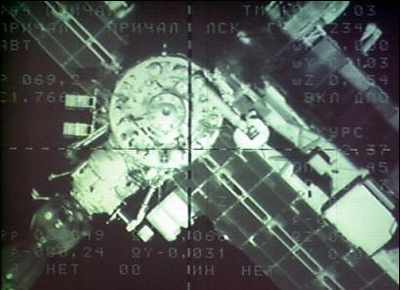Mon, May 17, 2004
ISS Crew Checks Suits, Takes Out Trash
International Space Station Commander Gennady Padalka and NASA
Science Officer and Flight Engineer Mike Fincke eased into a
regular schedule of operations in orbit last week, preparing
spacesuits for checkouts next week and loading trash aboard a
Progress vehicle that will soon depart.
Early in the week, Fincke conducted the second in a series of
battery recharging activities for the US spacesuits. The nickel
metal hydride batteries will be used during a spacesuit dry run
that is scheduled to be conducted next week. Fincke also worked on
the water servicing system of one of the spacesuits' liquid cooling
and ventilation garments. The garments, worn under the spacesuit,
are imbedded with a network of tiny tubes that provide cooling.
Fincke's maintenance work ensured no air bubbles will develop in
that tubing. The spacesuit work is part of preparations and
evaluations for a spacewalk planned for June 10 to replace a Remote
Power Control Module and restore power to a Station Control Moment
Gyroscope.
Both crew members also spent several hours loading trash into
the Progress 13 spacecraft, which is scheduled to be undocked from
the Station at 4:18 a.m. CDT May 24. The next Russian cargo
vehicle, Progress 14, is scheduled to launch May 25 from Kazakhstan
at 7:34 a.m. CDT and dock with the Station at 8:57 a.m. CDT May 27.
Among fresh food, clothes and other supplies to be brought to the
Station aboard Progress 14 are new spacesuit gloves and other
equipment that will be used during the June 10 spacewalk.
Also this week, US flight controllers transmitted a software
upgrade to several onboard computers. The upgrades are part of an
extensive program initiated this year to improve Station software.
They were loaded in four separate Station computers this week: two
external multiplexer/demultiplexers and two S0 Truss MDMs that
operate the systems on the truss.

The crew's scientific work included setting up a camera that
will be used by thousands of middle-school students. The Earth
Knowledge Acquired by Middle School Students (EarthKAM) camera was
set up to operate from a window in the Zvezda Service Module. For
these EarthKAM observations, more than sixty schools and 3,600
students are expected to participate. The EarthKAM program allows
students to research and select photos of sites on Earth to be
taken using the equipment aboard the Station.
Each day, crew members also had some time reserved for continued
Station familiarization and adaptation, as is routine for new
Station crew members during their first two weeks onboard.
Flight controllers are also preparing for a regularly scheduled
reboost of the ISS on Tuesday using the Progress engine for an
11-minute firing that will increase the altitude of the Station by
two statute miles at its apogee.
More News
The Airplane Made An Uncommanded Right Yaw And Roll, And He Was Unable To Maintain Control Of The Airplane On November 11, 2025, about 1750 central standard time, a Cirrus SR20, N8>[...]
Aero Linx: Florida Antique Biplane Association "Biplanes.....outrageous fun since 1903." That quote really defines what the Florida Antique Biplane Association (FABA) is all about.>[...]
Wind Shear Escape An unplanned abortive maneuver initiated by the pilot in command (PIC) as a result of onboard cockpit systems. Wind shear escapes are characterized by maximum thr>[...]
“Working closely with the Polish Armed Forces, we’re focused on disciplined execution to help enhance Poland’s defense capabilities and keep up with the strong de>[...]
Also: Bell 505 on SAF, NYPA Gets Flak For BizAv 'Abuse', FAA Venezuela Caution, Horizon Update Textron Aviation has confirmed it will be ending production of the Beechcraft Bonanza>[...]
 NTSB Prelim: Cirrus Design Corp SR20
NTSB Prelim: Cirrus Design Corp SR20 ANN's Daily Aero-Linx (11.30.25)
ANN's Daily Aero-Linx (11.30.25) ANN's Daily Aero-Term (11.30.25): Wind Shear Escape
ANN's Daily Aero-Term (11.30.25): Wind Shear Escape Aero-News: Quote of the Day (11.30.25)
Aero-News: Quote of the Day (11.30.25) Airborne 11.26.25: Bonanza-Baron Fini, Archer v LA NIMBYs, Gogo Loses$$$
Airborne 11.26.25: Bonanza-Baron Fini, Archer v LA NIMBYs, Gogo Loses$$$



